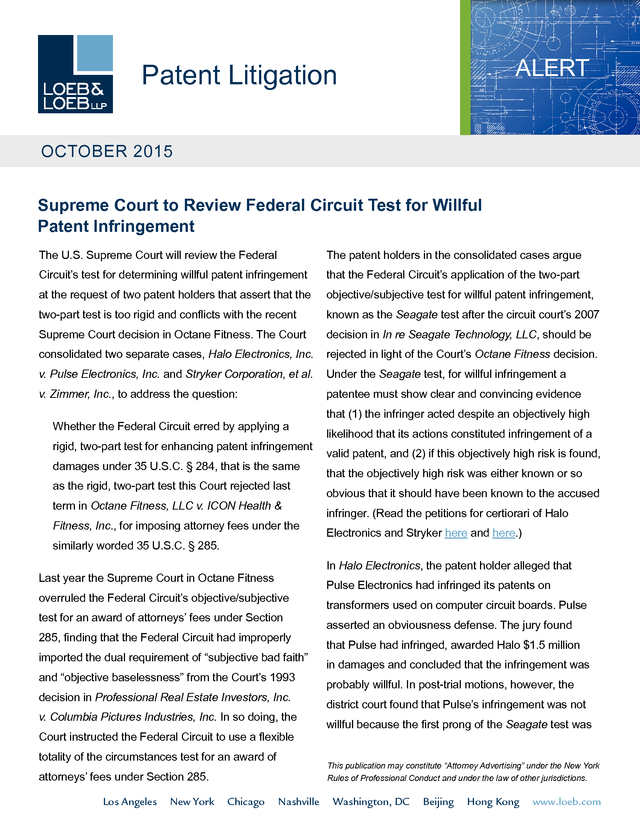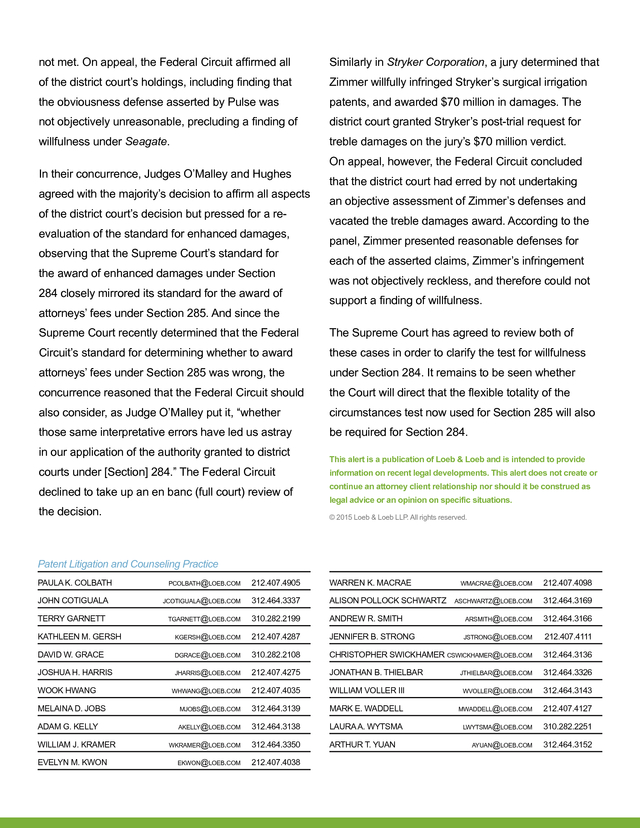Supreme Court To Review Federal Circuit Test for Willful Patent Infringement - October 2015
LOEB & LOEB
Description
ALERT
Patent Litigation
OCTOBER 2015
Supreme Court to Review Federal Circuit Test for Willful
Patent Infringement
The U.S. Supreme Court will review the Federal
The patent holders in the consolidated cases argue
Circuit’s test for determining willful patent infringement
that the Federal Circuit’s application of the two-part
at the request of two patent holders that assert that the
objective/subjective test for willful patent infringement,
two-part test is too rigid and conflicts with the recent
known as the Seagate test after the circuit court’s 2007
Supreme Court decision in Octane Fitness. The Court
decision in In re Seagate Technology, LLC, should be
consolidated two separate cases, Halo Electronics, Inc.
rejected in light of the Court’s Octane Fitness decision.
v. Pulse Electronics, Inc.
and Stryker Corporation, et al. Under the Seagate test, for willful infringement a v. Zimmer, Inc., to address the question: patentee must show clear and convincing evidence Whether the Federal Circuit erred by applying a rigid, two-part test for enhancing patent infringement damages under 35 U.S.C. § 284, that is the same as the rigid, two-part test this Court rejected last term in Octane Fitness, LLC v.
ICON Health & Fitness, Inc., for imposing attorney fees under the similarly worded 35 U.S.C. § 285. overruled the Federal Circuit’s objective/subjective test for an award of attorneys’ fees under Section 285, finding that the Federal Circuit had improperly imported the dual requirement of “subjective bad faith” and “objective baselessness” from the Court’s 1993 decision in Professional Real Estate Investors, Inc. v. Columbia Pictures Industries, Inc.
In so doing, the Court instructed the Federal Circuit to use a flexible totality of the circumstances test for an award of Chicago valid patent, and (2) if this objectively high risk is found, that the objectively high risk was either known or so obvious that it should have been known to the accused infringer. (Read the petitions for certiorari of Halo Electronics and Stryker here and here.) Pulse Electronics had infringed its patents on transformers used on computer circuit boards. Pulse asserted an obviousness defense.
The jury found that Pulse had infringed, awarded Halo $1.5 million in damages and concluded that the infringement was probably willful. In post-trial motions, however, the district court found that Pulse’s infringement was not willful because the first prong of the Seagate test was This publication may constitute “Attorney Advertising” under the New York Rules of Professional Conduct and under the law of other jurisdictions. attorneys’ fees under Section 285. New York likelihood that its actions constituted infringement of a In Halo Electronics, the patent holder alleged that Last year the Supreme Court in Octane Fitness Los Angeles that (1) the infringer acted despite an objectively high Nashville Washington, DC Beijing Hong Kong www.loeb.com . not met. On appeal, the Federal Circuit affirmed all Similarly in Stryker Corporation, a jury determined that of the district court’s holdings, including finding that Zimmer willfully infringed Stryker’s surgical irrigation the obviousness defense asserted by Pulse was patents, and awarded $70 million in damages. The not objectively unreasonable, precluding a finding of district court granted Stryker’s post-trial request for willfulness under Seagate. treble damages on the jury’s $70 million verdict. In their concurrence, Judges O’Malley and Hughes agreed with the majority’s decision to affirm all aspects of the district court’s decision but pressed for a reevaluation of the standard for enhanced damages, observing that the Supreme Court’s standard for the award of enhanced damages under Section 284 closely mirrored its standard for the award of attorneys’ fees under Section 285. And since the On appeal, however, the Federal Circuit concluded that the district court had erred by not undertaking an objective assessment of Zimmer’s defenses and vacated the treble damages award.
According to the panel, Zimmer presented reasonable defenses for each of the asserted claims, Zimmer’s infringement was not objectively reckless, and therefore could not support a finding of willfulness. Supreme Court recently determined that the Federal The Supreme Court has agreed to review both of Circuit’s standard for determining whether to award these cases in order to clarify the test for willfulness attorneys’ fees under Section 285 was wrong, the under Section 284. It remains to be seen whether concurrence reasoned that the Federal Circuit should the Court will direct that the flexible totality of the also consider, as Judge O’Malley put it, “whether circumstances test now used for Section 285 will also those same interpretative errors have led us astray be required for Section 284. in our application of the authority granted to district courts under [Section] 284.” The Federal Circuit declined to take up an en banc (full court) review of the decision. This alert is a publication of Loeb & Loeb and is intended to provide information on recent legal developments. This alert does not create or continue an attorney client relationship nor should it be construed as legal advice or an opinion on specific situations. © 2015 Loeb & Loeb LLP.
All rights reserved. Patent Litigation and Counseling Practice PAULA K. COLBATH pcolbath@loeb.com 212.407.4905 WARREN K. MACRAE wmacrae@loeb.com 212.407.4098 jcotiguala@loeb.com 312.464.3337 ALISON POLLOCK SCHWARTZ aschwartz@loeb.com 312.464.3169 tgarnett@loeb.com 310.282.2199 ANDREW R.
SMITH arsmith@loeb.com 312.464.3166 KATHLEEN M. GERSH kgersh@loeb.com 212.407.4287 JENNIFER B. STRONG jstrong@loeb.com 212.407.4111 DAVID W.
GRACE dgrace@loeb.com 310.282.2108 CHRISTOPHER SWICKHAMER cswickhamer@loeb.com 312.464.3136 JOSHUA H. HARRIS jharris@loeb.com 212.407.4275 JONATHAN B. THIELBAR jthielbar@loeb.com 312.464.3326 whwang@loeb.com 212.407.4035 WILLIAM VOLLER III wvoller@loeb.com 312.464.3143 MELAINA D.
JOBS mjobs@loeb.com 312.464.3139 MARK E. WADDELL mwaddell@loeb.com 212.407.4127 ADAM G. KELLY akelly@loeb.com 312.464.3138 LAURA A.
WYTSMA lwytsma@loeb.com 310.282.2251 wkramer@loeb.com 312.464.3350 ARTHUR T. YUAN ayuan@loeb.com 312.464.3152 ekwon@loeb.com 212.407.4038 JOHN COTIGUALA TERRY GARNETT WOOK HWANG WILLIAM J. KRAMER EVELYN M.
KWON .
and Stryker Corporation, et al. Under the Seagate test, for willful infringement a v. Zimmer, Inc., to address the question: patentee must show clear and convincing evidence Whether the Federal Circuit erred by applying a rigid, two-part test for enhancing patent infringement damages under 35 U.S.C. § 284, that is the same as the rigid, two-part test this Court rejected last term in Octane Fitness, LLC v.
ICON Health & Fitness, Inc., for imposing attorney fees under the similarly worded 35 U.S.C. § 285. overruled the Federal Circuit’s objective/subjective test for an award of attorneys’ fees under Section 285, finding that the Federal Circuit had improperly imported the dual requirement of “subjective bad faith” and “objective baselessness” from the Court’s 1993 decision in Professional Real Estate Investors, Inc. v. Columbia Pictures Industries, Inc.
In so doing, the Court instructed the Federal Circuit to use a flexible totality of the circumstances test for an award of Chicago valid patent, and (2) if this objectively high risk is found, that the objectively high risk was either known or so obvious that it should have been known to the accused infringer. (Read the petitions for certiorari of Halo Electronics and Stryker here and here.) Pulse Electronics had infringed its patents on transformers used on computer circuit boards. Pulse asserted an obviousness defense.
The jury found that Pulse had infringed, awarded Halo $1.5 million in damages and concluded that the infringement was probably willful. In post-trial motions, however, the district court found that Pulse’s infringement was not willful because the first prong of the Seagate test was This publication may constitute “Attorney Advertising” under the New York Rules of Professional Conduct and under the law of other jurisdictions. attorneys’ fees under Section 285. New York likelihood that its actions constituted infringement of a In Halo Electronics, the patent holder alleged that Last year the Supreme Court in Octane Fitness Los Angeles that (1) the infringer acted despite an objectively high Nashville Washington, DC Beijing Hong Kong www.loeb.com . not met. On appeal, the Federal Circuit affirmed all Similarly in Stryker Corporation, a jury determined that of the district court’s holdings, including finding that Zimmer willfully infringed Stryker’s surgical irrigation the obviousness defense asserted by Pulse was patents, and awarded $70 million in damages. The not objectively unreasonable, precluding a finding of district court granted Stryker’s post-trial request for willfulness under Seagate. treble damages on the jury’s $70 million verdict. In their concurrence, Judges O’Malley and Hughes agreed with the majority’s decision to affirm all aspects of the district court’s decision but pressed for a reevaluation of the standard for enhanced damages, observing that the Supreme Court’s standard for the award of enhanced damages under Section 284 closely mirrored its standard for the award of attorneys’ fees under Section 285. And since the On appeal, however, the Federal Circuit concluded that the district court had erred by not undertaking an objective assessment of Zimmer’s defenses and vacated the treble damages award.
According to the panel, Zimmer presented reasonable defenses for each of the asserted claims, Zimmer’s infringement was not objectively reckless, and therefore could not support a finding of willfulness. Supreme Court recently determined that the Federal The Supreme Court has agreed to review both of Circuit’s standard for determining whether to award these cases in order to clarify the test for willfulness attorneys’ fees under Section 285 was wrong, the under Section 284. It remains to be seen whether concurrence reasoned that the Federal Circuit should the Court will direct that the flexible totality of the also consider, as Judge O’Malley put it, “whether circumstances test now used for Section 285 will also those same interpretative errors have led us astray be required for Section 284. in our application of the authority granted to district courts under [Section] 284.” The Federal Circuit declined to take up an en banc (full court) review of the decision. This alert is a publication of Loeb & Loeb and is intended to provide information on recent legal developments. This alert does not create or continue an attorney client relationship nor should it be construed as legal advice or an opinion on specific situations. © 2015 Loeb & Loeb LLP.
All rights reserved. Patent Litigation and Counseling Practice PAULA K. COLBATH pcolbath@loeb.com 212.407.4905 WARREN K. MACRAE wmacrae@loeb.com 212.407.4098 jcotiguala@loeb.com 312.464.3337 ALISON POLLOCK SCHWARTZ aschwartz@loeb.com 312.464.3169 tgarnett@loeb.com 310.282.2199 ANDREW R.
SMITH arsmith@loeb.com 312.464.3166 KATHLEEN M. GERSH kgersh@loeb.com 212.407.4287 JENNIFER B. STRONG jstrong@loeb.com 212.407.4111 DAVID W.
GRACE dgrace@loeb.com 310.282.2108 CHRISTOPHER SWICKHAMER cswickhamer@loeb.com 312.464.3136 JOSHUA H. HARRIS jharris@loeb.com 212.407.4275 JONATHAN B. THIELBAR jthielbar@loeb.com 312.464.3326 whwang@loeb.com 212.407.4035 WILLIAM VOLLER III wvoller@loeb.com 312.464.3143 MELAINA D.
JOBS mjobs@loeb.com 312.464.3139 MARK E. WADDELL mwaddell@loeb.com 212.407.4127 ADAM G. KELLY akelly@loeb.com 312.464.3138 LAURA A.
WYTSMA lwytsma@loeb.com 310.282.2251 wkramer@loeb.com 312.464.3350 ARTHUR T. YUAN ayuan@loeb.com 312.464.3152 ekwon@loeb.com 212.407.4038 JOHN COTIGUALA TERRY GARNETT WOOK HWANG WILLIAM J. KRAMER EVELYN M.
KWON .













